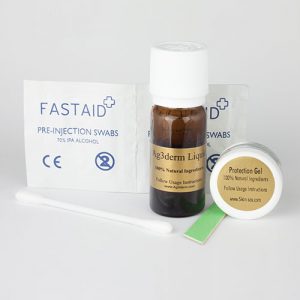Laser treatment can be a great way to rejuvenate skin and can help pigmentation problems such as hyperpigmentation. One of the newest laser treatments is Fraxel laser, which has been compared to “spiking the lawn”. Fraxel laser treatment sends tunnels of laser energy into the skin which make the darker skin turn over more quickly. The fraxel laser stimulates collagen production and removes microscopic islands of epidermis which can improve skin discoloration. A course of two to six treatments is recommended for best results in improving skin pigmentation problems.
Laser treatments should only be administers by trained registered specialists. New technology has made laser treatments far safer when they are used properly. It is nonetheless very important to choose a trained specialist to administer your laser treatment. There are still potential risks involved with all laser treatment, including fraxel laser treatment. Fraxel laser therapy is uncomfortable and can be painful but an anesthetic cream can be used to help with discomfort. Fraxel laser therapy may cause the skin to be red and weepy for a number of days afterwards. However, fraxel laser therapy has also been known to cause skin pigmentation in some patients. Patients who choose to have fraxel laser therapy to benefit from its anti-aging effects have reported that fraxel laser therapy has caused pigmentation as a side effect.
Dermatologists warn that hyper-pigmentation can occur with any trauma on some skin. Not only fraxel laser treatment, pigmentation problems also present on some people’s skin as a result of sunburn, waxing, laser hair removal, chemical peels and other treatments. Deep heating can lead to inflammation which stimulates pigmentation, particularly in darker skin types. Darker skin types are most at risk of getting pigmentation side effects as a result of fraxel laser treatment. Laser treatment leads to discoloration in the form of spots on the face or body because the skin cells that normally produce brown pigment go into overdrive. In the case of fraxel laser treatment, it is recommended that the energy settings on the laser be decreased for patients with darker skin or those prone to pigmentation patches.
Your doctor can prescribe lightening creams or chemical peels to even the skin tone again. Pigmentation can also be improved by the use of prescription retinoids and bleaching agents, which your doctor can prescribe for you. In many cases, however, the increase in pigmentation will fade by itself over time. Sun avoidance is very important after fraxel laser treatment to avoid skin discolouration. Using sunblock is essential, no matter what tone of skin color you have. Using a broad spectrum SPF and avoiding direct, intense sun is imperative to prevent pigmentation and to maintain the benefit from fraxel laser treatments.
Recent Skin Pigmentation Articles:
Famous People With Pigmentation
Pigmentation And Enzyme Therapy

